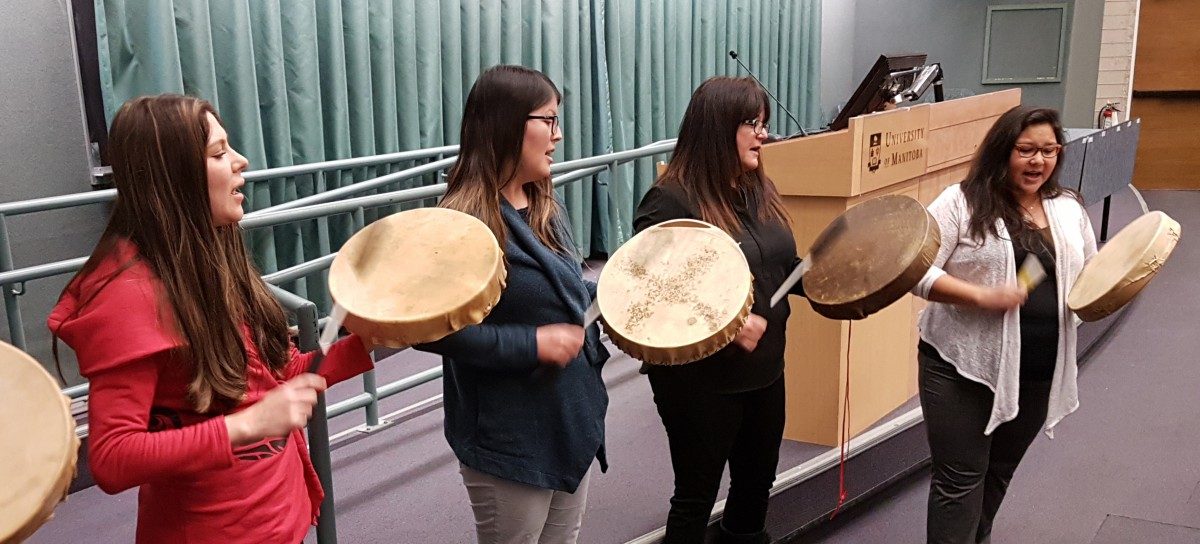
DAWN LAVAND (RIGHT) LEADS A SONG AT THE INDIGENOUS HEALTH RESEARCH SYMPOSIUM.
Stories of Indigenous resurgence shared at health symposium
Lea Mutch and Charmaine Delaronde were Indigenous nurses in Point Douglas, the neighbourhood with the largest Indigenous population in the Winnipeg Health Region, and the lowest rate of breastfeeding.
They heard from Indigenous moms that breastfeeding support groups run by the health region were inconveniently located. And when the moms attended, they felt uncomfortable and out of place, so they didn’t go back.
“We thought, ‘We need our own group. We’re not meeting the needs of our women,’” Mutch said in a presentation at the U of M’s fifth annual Indigenous Health Research Symposium, held Nov. 22 and 23 on the Bannatyne campus. “We had to push back against the system.”
The pair decided to conduct focus groups to hear what community members wanted. The positive result is Noon Nii Yow As So Soo Ou, a peer-led, weekly drop-in breastfeeding and parenting group in Point Douglas. The group is based on Indigenous ways of knowing and being.
Like many projects presented at the symposium, the breastfeeding initiative took a decolonizing approach and integrated traditional knowledge. The symposium’s overall theme was Looking Forward, Pushing Back: Research, Resistance, Resurgence.
About 150 researchers, students, faculty and community members attended the two-day gathering organized by Ongomiizwin – Research, part of the Indigenous Institute of Health and Healing in the Rady Faculty of Health Sciences.
“At a symposium like this, where everyone’s focus is on improving Indigenous health, you make important connections and build relationships,” said Wanda Phillips-Beck, a nurse manager who presented a study about prenatal care.
“It’s also an opportunity for researchers who don’t do research in First Nations, Inuit or Metis communities to learn about our protocols and methods.”
Linda Diffey, an Indigenous PhD candidate who co-leads the Indigenous health curriculum in undergraduate medical education at the U of M, gave a keynote presentation. Envisioning decolonization as a road, she described how settler-colonial narratives can push Indigenous people onto off-ramps or into the ditch by undermining or silencing them.
At a university, Diffey said, such narratives can include expecting Indigenous people to be resilient rather than speaking their truth; invalidating Indigenous courses as leftist, unscientific or inappropriately spiritual; and labelling Indigenous faculty or students as angry or radical.
At a panel discussion, Ongomiizwin directors expressed their hopes for the future.
Dr. Josée Lavoie, director of research at Ongomiizwin, called for changes to the university reward system that pressures tenure-track faculty to bring in grant money and publish research quickly. Universities, she said, must recognize that Indigenous research requires building relationships, establishing trust and forming partnerships with community members – an approach that takes more time.
Dr. Marcia Anderson, executive director of Indigenous academic affairs at Ongomiizwin, said the long-term effects of residential schools, the ’60s Scoop and the child welfare system on Indigenous people’s health are just beginning to be recognized. “I would like to see us open a survivors’ clinic that is multidisciplinary,” she said.
Melanie MacKinnon, Ongomiizwin’s executive director of Indigenous health services, envisioned that Ongomiizwin – Health Services could evolve into the initial clinical arm of a self-governing Indigenous health system for Manitoba. “We’d like to see an Indigenous health authority … in our professional lifetime,” she said.
Dr. Barry Lavallee, director of education at Ongomiizwin, said it’s essential to teach medical students about the pervasive stereotyping of Indigenous patients so that when students become doctors, “they’ll treat an Indigenous person as fully human.”
The symposium recognized Tabitha Martens, an Indigenous PhD student, with the award for the best student presentation. Martens spoke about a year-long project in which Indigenous students from an inner-city Winnipeg high school learned to ice fish, tap maple trees, plant a garden and cook traditional food.
The program not only built skills, Martens’ research found, but strengthened students’ Indigenous identity.






